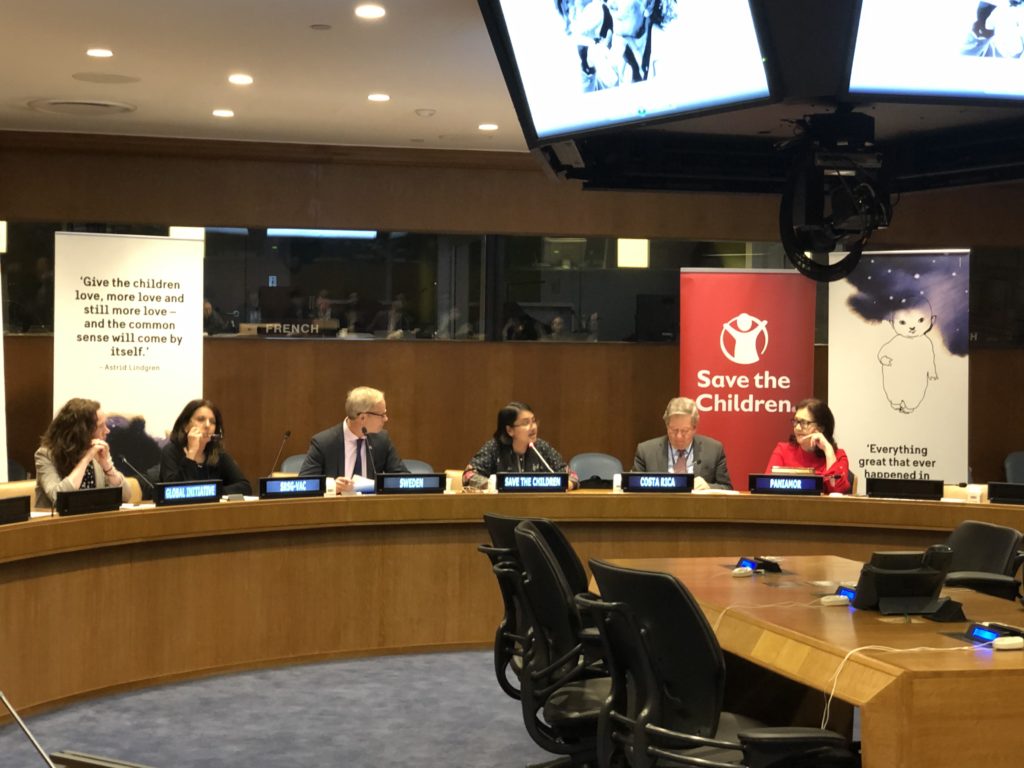Raising children without violence is possible: Highlights from an interactive event in New York
Written by:
Laila Khondkar
Head of Advocacy and Policy, Child Protection, Save the Children International

Photo credit: Save the Children International, 2019
A high-level interactive event “Raising Children without Violence is Possible: How Positive Discipline Leads to Change and Benefits Society” was organized at the United Nations Secretariat in New York on 15 October 2019, co-hosted by the Governments of Sweden and Costa Rica, the Swedish Institute and Save the Children.
Representatives of the United Nations, Member States (Sweden, Costa Rica, Bangladesh, El Salvador, India, Israel, Japan, Oman), civil society and academia attended the event. Opening remarks were made by Ambassador Olof Skoog, Permanent Representative of Sweden to the United Nations, who reflected on Sweden’s journey to ban Physical and Humiliating Punishment (PHP) of children in all settings 40 years ago, and how the law brought about positive changes in society.
Speakers of the panel discussion included Dr. Najat Maalla M’jid, Special Representative of the Secretary-General on Violence against Children; Milena Grillo, Director of Strategy and Innovation, Paniamor, Costa Rica; and Anna Henry, Director, Global Initiative to End All Corporal Punishment of Children. Highlights from the panel discussion included:
- On average, about 80 per cent of children worldwide experience some form of violent “discipline” at home. PHP is often perpetrated by people close to them – such as their parents, family members, caregivers and teachers. PHP negatively affects children’s physical and psychological health, cognitive development and education, and also increases the likelihood of perpetrating and experiencing violence as an adult. If societies continue to allow PHP of children then it will become impossible to break the inter-generational cycle of violence.
- Despite its widespread use and proven detrimental effects on children in the short and long term, PHP remains lawful in many countries. This violates children’s human rights to physical integrity, human dignity and equal protection under the law, and is a serious violation of children’s rights under the United Nations Convention on the Rights of the Child (UNCRC). Ending PHP is a human rights imperative and also essential if the world is to meet the Sustainable Development Goal target 16.2 to end all violence against children by 2030.
- Law reform has led to reduced acceptance of PHP among parents and other members of society.
- Positive parenting programmes promote non-violent child rearing practices and changes perceptions and attitudes among parents, caregivers and other people working with children.
- All Governments should enact laws banning PHP in all settings in line with the UNCRC. In addition, Governments should enforce and monitor the implementation of the legal ban through relevant policies and programmes and public awareness raising campaigns, and allocate adequate funding and investments in child protection systems.
- Governments and other actors involved in combating PHP should engage with children and respect their views in all aspects of preventing and responding to PHP.
Questions from participants following the panel session focused on developing the capacity of parents, caregivers and other professionals in ending PHP. Ambassador Rodrigo Carazo Zeledón, Permanent Representative of Costa Rica to the United Nations, delivered closing remarks.
The event was live streamed on UN Web TV and can be watched back below.
Source: UN Web TV
